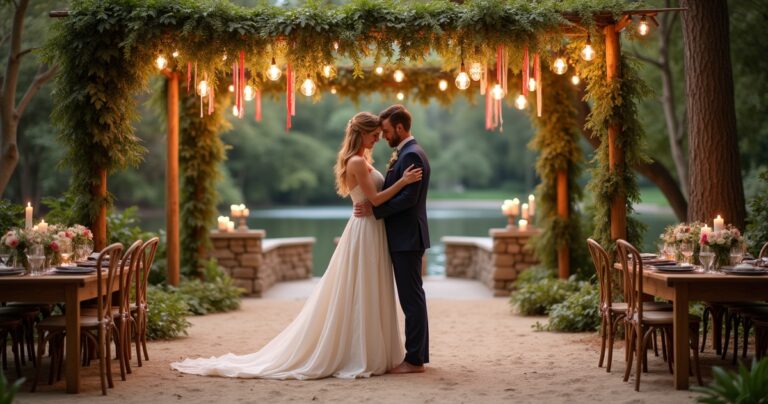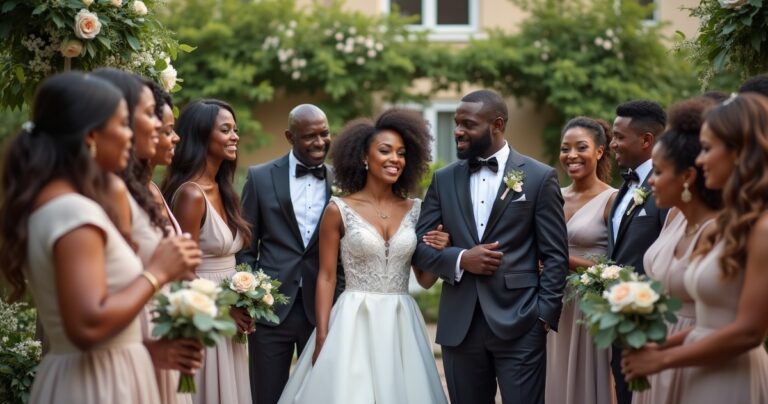Planning a wedding is an exciting journey, but it can also be a financial challenge. Creating and managing a wedding budget is crucial to ensure your big day is both memorable and financially responsible. This guide will walk you through the essential steps to craft a budget that aligns with your vision and financial situation.
What is a Wedding Budget and Why is it Important?
A wedding budget is a financial plan that outlines the expected costs associated with your wedding. It is important because it helps you allocate funds efficiently, avoid overspending, and prioritize what matters most to you.
A well-structured budget ensures that you can enjoy your wedding day without financial stress. It also provides a clear framework for making decisions about venues, vendors, and other wedding elements.
- Helps prioritize spending : Focus on what truly matters.
- Prevents financial stress : Avoid unexpected expenses.
- Facilitates decision-making : Choose vendors and venues wisely.
Key Components of a Wedding Budget
Understanding the key components of a wedding budget is essential for effective planning. These components include venue, catering, attire, photography, and more.
Average Wedding Costs in 2025
According to The Knot, the average wedding cost in 2025 is approximately 0,000. This figure varies based on location, guest count, and personal preferences.
- Venue : Often the largest expense.
- Catering : Costs depend on menu choices and guest count.
- Attire : Includes wedding dress, tuxedo, and accessories.
How to Determine Your Wedding Budget?
Determining your wedding budget involves assessing your financial situation, identifying contributors, and setting realistic expectations.
Assessing Your Financial Situation
Start by evaluating your current financial status. Consider your savings, monthly income, and any existing debts.
- Savings : Determine how much you can allocate.
- Income : Calculate monthly contributions.
- Debts : Factor in existing financial obligations.
Identifying Contributors to the Wedding Fund
Identify who will contribute to the wedding fund. This could include parents, family members, or the couple themselves.
- Family contributions : Discuss with parents or relatives.
- Personal savings : Decide how much you can save.
- Joint contributions : Combine resources as a couple.
Setting Realistic Expectations
Set realistic expectations by aligning your dream wedding with your financial capabilities. This involves prioritizing essential elements and being open to compromises.
- Prioritize essentials : Focus on must-haves.
- Be flexible : Consider alternative options.
- Communicate openly : Discuss expectations with your partner.
Creating a Comprehensive Wedding Budget Breakdown
A detailed budget breakdown helps allocate funds effectively across various wedding elements.
Percentage Allocation for Major Expenses
Allocate percentages of your budget to major expenses such as venue, catering, and attire.
- Venue : 30-40% of the budget.
- Catering : 20-30% of the budget.
- Attire : 10-15% of the budget.
Prioritizing Wedding Elements
Identify which elements are most important to you and allocate funds accordingly.
- Must-haves : Venue, food, and photography.
- Nice-to-haves : Entertainment, decor, and favors.
- Optional extras : Luxury items or services.
Accounting for Hidden Costs
Be aware of hidden costs such as taxes, tips, and service fees that can add up quickly.
- Taxes : Include sales tax in your budget.
- Tips : Allocate funds for vendor gratuities.
- Service fees : Consider additional charges from vendors.
How to Save Money on Your Wedding Budget?
Saving money on your wedding budget is possible with strategic planning and creativity.
DIY Wedding Ideas
Consider do-it-yourself projects to add a personal touch and save money.
- Invitations : Design and print your own.
- Decor : Create centerpieces and decorations.
- Favors : Craft personalized gifts for guests.
Off-Season and Non-Traditional Venue Options
Choose off-season dates or non-traditional venues to reduce costs.
- Off-season : Book during less popular months.
- Non-traditional venues : Consider parks or community centers.
- Weekday weddings : Opt for a weekday to save on venue costs.
Negotiating with Vendors
Negotiate with vendors to get the best deals and stay within your budget.
- Bundle services : Combine services for discounts.
- Ask for discounts : Inquire about special offers.
- Flexible dates : Be open to vendor availability.
Wedding Budget Tracking Tools and Techniques
Tracking your wedding budget is essential to ensure you stay on track.
Spreadsheet Templates
Use spreadsheet templates to organize and track expenses.
- Customizable : Tailor to your specific needs.
- Detailed tracking : Monitor every expense.
- Easy updates : Adjust as needed.
Wedding Budget Apps
Consider using wedding budget apps for convenient tracking on the go.
- User-friendly : Intuitive interfaces.
- Real-time updates : Access from any device.
- Expense categorization : Organize by category.
Tips for Staying Organized
Stay organized by keeping all budget-related documents and receipts in one place.
- Create a folder : Store contracts and receipts.
- Regular reviews : Check your budget frequently.
- Set reminders : Schedule regular budget check-ins.
How Much Should I Budget for a 100-Person Wedding?
Budgeting for a 100-person wedding depends on various factors, including location and personal preferences.
Factors Affecting Per-Guest Costs
Per-guest costs can vary based on menu choices, venue, and entertainment.
- Menu selection : Choose cost-effective options.
- Venue size : Consider capacity and amenities.
- Entertainment : Opt for affordable options.
Sample Budget Breakdown for 100 Guests
Here’s a sample budget breakdown for a 100-person wedding:
| Expense Category | Percentage of Budget | Estimated Cost |
| Venue | 30% | ,000 |
| Catering | 25% | ,500 |
| Attire | 10% | ,000 |
| Photography | 10% | ,000 |
| Entertainment | 5% | ,500 |
| Decor | 10% | ,000 |
| Miscellaneous | 10% | ,000 |
What is the Average Cost of a Wedding?
The average cost of a wedding varies by region and personal preferences.
National and Regional Wedding Cost Averages
Nationally, the average wedding cost is around 0,000, but this can vary significantly by region.
- Urban areas : Higher costs due to demand.
- Rural areas : More affordable options.
- Destination weddings : Additional travel expenses.
Breakdown of Expenses by Category
Understanding the breakdown of expenses helps in planning and prioritizing.
- Venue and catering : Largest portion of the budget.
- Attire and accessories : Includes dress, tuxedo, and jewelry.
- Photography and videography : Capturing memories.
How Can I Plan a Wedding on a Small Budget?
Planning a wedding on a small budget requires creativity and prioritization.
Prioritizing Essential Elements
Focus on essential elements that matter most to you and your partner.
- Venue : Choose an affordable location.
- Food : Opt for a simple menu.
- Photography : Hire a talented amateur.
Creative Cost-Cutting Strategies
Implement creative strategies to cut costs without sacrificing quality.
- DIY projects : Personalize decor and favors.
- Second-hand attire : Consider pre-owned dresses.
- Minimalist decor : Focus on simplicity.
Alternatives to Traditional Wedding Expenses
Explore alternatives to traditional expenses to save money.
- E-invitations : Send digital invites.
- Potluck reception : Involve guests in catering.
- Public venues : Use parks or beaches.
Wedding Budget Considerations for Different Types of Ceremonies
Different types of ceremonies require unique budget considerations.
Destination Weddings
Destination weddings often involve additional travel and accommodation costs.
- Travel expenses : Include flights and lodging.
- Guest accommodations : Consider group rates.
- Local vendors : Hire vendors at the destination.
Intimate Gatherings
Intimate gatherings focus on close family and friends, reducing costs.
- Smaller guest list : Lower catering and venue costs.
- Personalized experience : Focus on meaningful details.
- Home venues : Host at a family home.
Luxury Celebrations
Luxury celebrations involve higher budgets for premium services and venues.
- High-end venues : Exclusive locations.
- Gourmet catering : Premium menu options.
- Designer attire : Custom-made dresses and suits.
How to Handle Unexpected Wedding Expenses?
Unexpected expenses can arise, so it’s important to be prepared.
Building an Emergency Fund into Your Wedding Budget
Include an emergency fund in your budget to cover unforeseen costs.
- Allocate 5-10% : Set aside for emergencies.
- Flexible spending : Adjust as needed.
- Peace of mind : Reduce financial stress.
Strategies for Dealing with Last-Minute Costs
Have strategies in place to manage last-minute expenses effectively.
- Negotiate with vendors : Discuss payment plans.
- Cut non-essential costs : Reallocate funds.
- Seek financial help : Consider family support.
What Percentage of the Wedding Budget Should Be Spent on the Venue?
The percentage of the budget spent on the venue depends on various factors.
Typical Venue Cost Allocations
Typically, 30-40% of the wedding budget is allocated to the venue.
- Venue type : Influences cost.
- Location : Urban vs. rural pricing.
- Amenities : Included services and features.
Factors Influencing Venue Expenses
Several factors can influence venue expenses, including location and time of year.
- Seasonality : Peak vs. off-peak pricing.
- Guest count : Larger venues cost more.
- Venue reputation : High-demand locations.
Working with Wedding Vendors Within Your Budget
Collaborating with vendors within your budget is crucial for financial success.
Communicating Your Budget Constraints
Clearly communicate your budget constraints to vendors from the start.
- Be transparent : Share your budget upfront.
- Discuss priorities : Focus on essential services.
- Seek recommendations : Ask for cost-effective options.
Negotiating Packages and Services
Negotiate packages and services to get the best value for your money.
- Bundle services : Combine for discounts.
- Flexible options : Explore different packages.
- Request custom quotes : Tailored to your needs.
Reading and Understanding Vendor Contracts
Carefully read and understand vendor contracts to avoid surprises.
- Review terms : Check for hidden fees.
- Clarify details : Ask questions if needed.
- Confirm deliverables : Ensure all services are listed.
Balancing Wedding Budget Priorities as a Couple
Balancing budget priorities as a couple involves open communication and compromise.
Identifying Must-Haves vs. Nice-to-Haves
Identify must-haves and nice-to-haves to allocate funds effectively.
- Essential elements : Venue, food, and attire.
- Optional extras : Entertainment and decor.
- Shared priorities : Align on key aspects.
Compromising on Budget Allocations
Be willing to compromise on budget allocations to meet both partners’ needs.
- Discuss openly : Share preferences and concerns.
- Find middle ground : Balance individual desires.
- Adjust as needed : Be flexible with changes.
Aligning Expectations with Financial Realities
Align expectations with financial realities to avoid disappointment.
- Set realistic goals : Based on budget constraints.
- Manage expectations : Be open to alternatives.
- Celebrate together : Focus on the joy of the day.
Post-Wedding Budget Analysis
After the wedding, analyze your budget to evaluate expenses and learn for the future.
Evaluating Actual Expenses Against Planned Budget
Compare actual expenses to your planned budget to identify discrepancies.
- Track variances : Note differences in costs.
- Analyze reasons : Understand overspending.
- Adjust future plans : Learn from experience.
Lessons Learned for Future Financial Planning
Reflect on lessons learned to improve future financial planning.
- Budget accuracy : Improve estimation skills.
- Expense tracking : Enhance organization.
- Financial goals : Set realistic future goals.
By following this comprehensive guide, you can create and manage a wedding budget that ensures your special day is both beautiful and financially sound. Remember, the key to a successful wedding budget is planning, communication, and flexibility.







